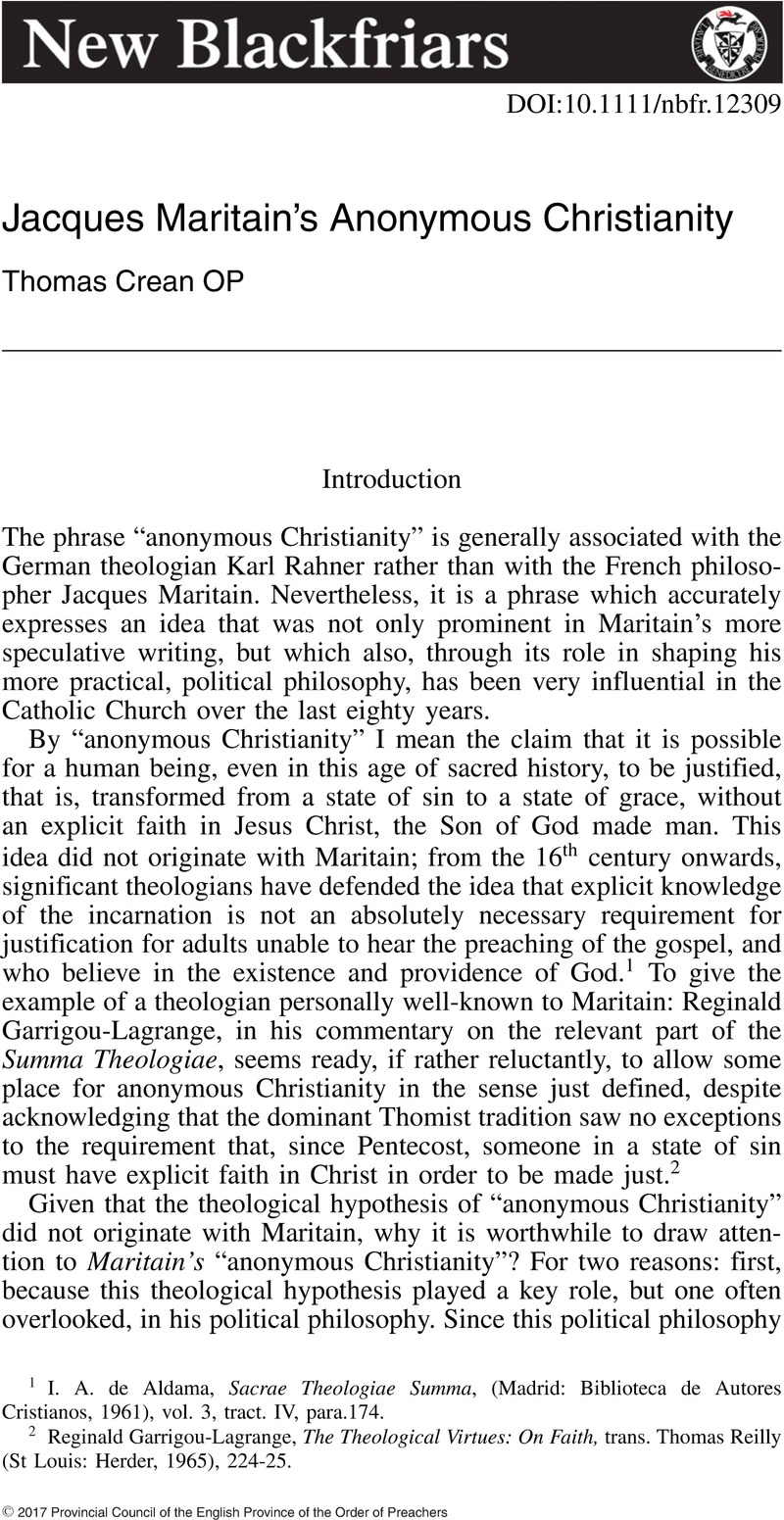No CrossRef data available.
Article contents
Jacques Maritain's Anonymous Christianity
Published online by Cambridge University Press: 01 January 2024
Abstract

- Type
- Original Article
- Information
- Copyright
- Copyright © 2017 Provincial Council of the English Province of the Order of Preachers
References
1 de Aldama, I. A., Sacrae Theologiae Summa, (Madrid: Biblioteca de Autores Cristianos, 1961), vol. 3, tract. IV, para.174Google Scholar.
2 Garrigou‐Lagrange, Reginald, The Theological Virtues: On Faith, trans. Reilly, Thomas (St Louis: Herder, 1965), 224‐25Google Scholar.
3 Cf. Council of Trent, Session VI, Decree on Justification, chapter 1 and canon 1.
4 Maritain, J., True Humanism (London: Geoffrey Bles: The Centenary Press, 1938), 163Google Scholar.
5 Ibid., 57.
6 Maritain, J., ‘Who is my neighbour?’, in Redeeming the Time (London: Geoffrey Bles: The Centenary Press, 1943), 107Google Scholar.
7 It is therefore surprising that Charles Journet, in a private letter to Maritain, said of the essay “Qui est mon prochain?”: “I found nothing in it which could cause any of the theologians to take offence” (“Je n'ai rien trouvé qui puisse porter ombrage à personne parmi les théologiens”, letter of 1st July 1939 in Favez, Claude, Favre, Jacqueline et al. (ed.) Journet‐Maritain Corrrespondance (Fribourg: Fondation du Cardinal Journet, Editions Universitaires, 1997), vol. 2: 680Google Scholar. Perhaps Journet's esteem for Maritain led him to overlook the novelty of his friend's position.
8 Maritain, J., Le Paysan de la Garonne (Paris: Desclee de Bouwer, 1966), 121Google Scholar.
9 Maritain, J., On the Church of Christ: the Person of the Church and her Personnel, trans. Evans, Joseph (University of Notre Dame Press: Notre Dame, Indiana, 1973), chapter X, section IIGoogle Scholar, available on‐line at https://www3.nd.edu/Departments/Maritain/etext/otcoc10.htm (accessed 18th August 2015).
10 Maritain, J., ‘The Immanent Dialectic of the First Act of Freedom’ in The Range of Reason (London: Geoffrey Bles, 1953)Google Scholar.
11 Ibid.
12 Ibid.
13 Cf. Council of Trent, Session VI, Decree on Justification, chapter 1 and canon 1.
14 J. Maritain, ‘The Immanent Dialectic…’
15 Creative Intuition in Art and Poetry, (London: The Harvill Press, 1953)Google Scholar, especially pp. 91‐99; On the Grace and Humanity of Jesus, trans. Evans, Joseph (London: Burns & Oates, 1968), pp. 49 ffGoogle Scholar.
16 Creative Intuition, 91‐92.
17 Maritain's extension of the grace of justification to atheists was criticised by his Argentinian adversary, Jules Meinvielle, as incompatible with chapter one of the Letter to the Romans; cf. Meinvielle, Jules, De Lamennais à Maritain (Paris: La Cité Catholique, n.d.), 151‐52Google Scholar. One may also wonder what St Paul would have made of the “idolaters with pure hearts” mentioned in “Qui est mon prochain?”.
18 Cf. Catechism of the Catholic Church, 150: “Faith is first of all a personal adherence of man to God. At the same time, and inseparably, it is a free assent to the whole truth that God has revealed.”
19 Cf. ibid., “Faith is . . . a free assent to the whole truth that God has revealed”, and ibid. 155: “Believing is an act of the intellect assenting to the divine truth by command of the will moved by God through grace.”




